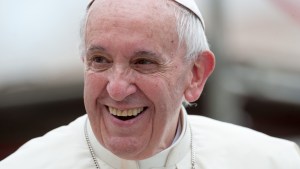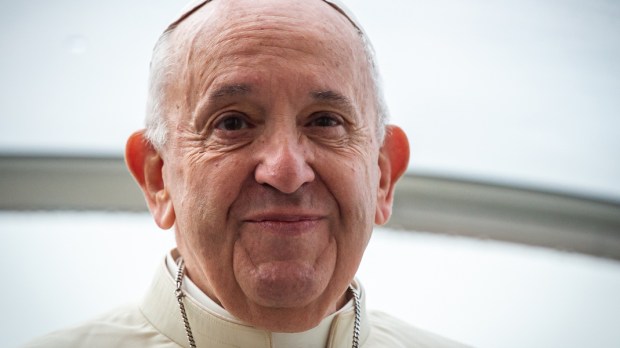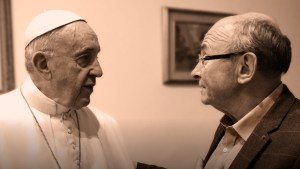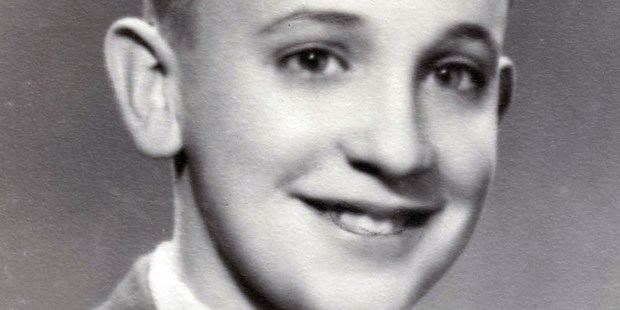Simplicity, good humor, and living at peace with God and himself — this is undoubtedly at the core of the “fountain of youth” that is keeping Pope Francis going strong, now as one of the oldest pontiffs of history.
The Holy Father was born December 17, 1936, entered the Society of Jesus at age 21, and was ordained a priest just before he turned 33. At age 55 he was made an auxiliary bishop, and became archbishop of Buenos Aires at 61. He was 64 when he was made a cardinal, and 76 when he was elected the Successor of Peter.
Today he maintains a busy — sometimes grueling — schedule of appointments and travels.
But much of what keeps his energy high is attainable for the rest of us. Here are some of his secrets,
First off, recognize God’s gifts
“My peace is a gift of the Lord,” he says. “I hope it doesn’t leave me!”
Turn problems over to St. Joseph
The Holy Father’s devotion to St. Joseph is well known. Undoubtedly, his robust faith in the Protector of the Church keeps him at peace:
“If there’s a problem, I write a message to St. Joseph on a piece of paper and I put it under the statue of him I have in my room,” he explained in 2017 in an interview with Corriere della Sera. “It is a statue of St. Joseph asleep. And now he sleeps on a pillow of little papers!”
The statue evokes the state in which St. Joseph received his messages from God: It was in his dreams that he was told he should take Mary as his wife, and that he must take her and the Child to flee from Herod.
Pope Francis’ devotion to St. Joseph goes all the way back to his youth, when at age 17 he received his calling to the priesthood in the Basilica of St. Joseph. To have the statue of the sleeping saint next to him on his nightstand, the pope says, is better than a sleeping pill.
Take rest in God
Pope Francis takes time each day to “rest in God,” and to discern his will. “He reveals his loving plan when we are in repose,” explains the pope, adding that this rest is necessary for the “health of our spirit and of our bodies.”
Even though it’s difficult to create this space of quiet restfulness in God, “it is essential for hearing the voice of God, and understanding what he asks of us.”
Early to bed, early to rise
Francis maintains a regular daily schedule and it’s said he turns in before 9 p.m., so as to be awake by 4 a.m. He also has a short siesta after lunch.
And, well, he’s at peace with himself if sleep sneaks up on him in prayer. “I sometimes fall asleep when I pray,” he admitted with a smile during an interview in 2017. “St. Therese of the Child Jesus said that she did as well, but that she was still pleasing to God.”
The pope explained: A believer should be with God “like a child in the arms of his father” since “this is one of the many ways to bless the name of God, to feel like a child in his arms.”
De-stress with prayer
Pope Francis affirms that the best way to keep stress at bay is, simply, to pray. And he prays a lot. “I pray according to my style. I love the breviary and I always have it with me. Mass, every day. The Rosary … When I pray, I always turn to the Bible. And then peace grows within me.”
But the pope’s tricks to deal with anxiety are more than prayer. He’s a great promoter of mental health and has been open about the key role a psychiatrist played in his own journey.
In an interview in 2021 with La Nacion, the Holy Father spoke with a journalist-doctor about his own care for his mental health.
The Holy Father explained how, as a director of the Jesuit community in Argentina, “during the terrible days of the dictatorship, during which I transported people in secret to get them out of the country and thus save their lives, I had to handle situations which I didn’t know how to face. It was then that I went to see a woman—a great woman—who had helped me interpret some psychological tests for the novices. Then, for six months, I had a consultation with her once a week.”
The pope explained that this psychiatrist helped him to “orient myself regarding the way to handle the fears of that time. Imagine what it was like to transport someone hidden in your car—only covered by a blanket—and to pass through three military checkpoints in the Campo de Mayo area. It caused me enormous tension.”
But, he said, his sessions with the doctor helped him to establish habits beyond the political crisis of the time.
My treatment with the psychiatrist also helped me to orient myself and learn to manage my anxiety and avoid making decisions in a hurry. The process of making decisions is always complex. And the advice and observations she gave me were very useful. She was a very capable professional, and fundamentally, a very good person. I’m still enormously grateful to her. Her teachings are still of great use to me today.

Keep a sense of humor
“Without a sense of humor, it’s hard to be happy,” Francis says in God Is Young. The Holy Father says that a Christian should always have a sense of humor because it’s necessary for “enjoying life, for getting enthusiastic about things.” Quoting Chesterton, he adds, “Life is much too important to be taken seriously.”
In 2014, he told the Roman Curia that he prays Thomas More’s Prayer for Good Humor every day:
Prayer for Good Humor
by St. Thomas MoreGrant me, O Lord, good digestion, and also something to digest.
Grant me a healthy body, and the necessary good humor to maintain it.
Grant me a simple soul that knows to treasure all that is good
and that doesn’t frighten easily at the sight of evil,
but rather finds the means to put things back in their place.
Give me a soul that knows not boredom, grumblings, sighs and laments,
nor excess of stress, because of that obstructing thing called “I.”
Grant me, O Lord, a sense of good humor.
Allow me the grace to be able to take a joke to discover in life a bit of joy,
and to be able to share it with others.
Finally, say no to sin and yes to God
Lastly, Pope Francis’ fountain of youth is found in his clear conscience. “What ages a person isn’t years, it’s sin,” he explains. Thus, Our Lady gives the most resplendent example of enduring youthfulness: “Her youthfulness is not in her age, nor is her beauty in her exterior appearance. …” Francis noted. “In many paintings, Mary is represented sitting before an angel with a book in her hands. This book is Scripture. Mary always listened to God and spent her time with him. The Word of God was her secret: near her heart, it took flesh in her womb.”
Following Our Lady, the Holy Father invites us all to open our hearts to the grace of youthfulness by saying no to sin and living a luminous life in our “yes” to God.



